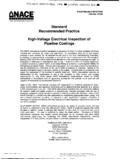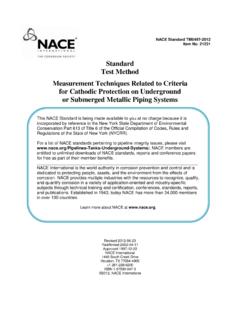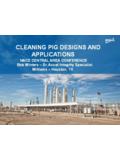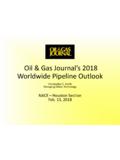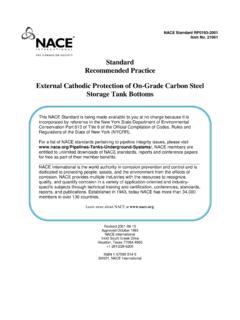Transcription of Understanding NACE MR0175 ISO 15156 - …
1 Corrosion Courses for In House Training, Course on Demand, Online and Distance Learning. 1 WebCorr Corrosion Consulting Services Presents Understanding NACE MR0175 / ISO 15156 Petroleum and Natural Gas Industries Materials for use in H2S containing Environments in Oil and Gas Production Date: As published on website Venue: As published on website Course Overview The 2015 edition of BS EN ISO 15156 (also known as ANSI/NACE MR0175 ) "Petroleum and natural gas industries Materials for use in H2S containing environments in oil and gas production" is the latest standard that updates the 2009 edition with material from a number of technical circulars introduced through the ballot process since the last publication. The latest 2015 edition gives requirements and recommendations for the selection and qualification of cast irons, carbon steels, low alloy steels, stainless steels, and other corrosion resistant alloys for service in equipment used in oil and natural gas production and natural gas treatment plants in H2S containing environments.
2 The failure of these equipment could pose a potential risk to the health and safety of the public and personnel or to the environment. The selection of crack resistant materials for use in H2S containing environments has had a significant impact on various aspects of the oil and gas in dustry worldwide. This 3 day course aims to help participants understand the various requirements and to provide guidance and assistance on how to comply to the BS EN ISO 15156 (ANSI/NACE MR0175 ) standard. Case studies will be presented for group exercise and discussions. Scope Normative references Terms and definitions Abbreviated terms General principles Evaluation and definition of service conditions to enable material selection Selection of materials resistant to SSC/SCC in the presence of sulfides Qualification of materials for H2S service Material description and documentation Qualification based upon field experience Qualification based upon laboratory testing General Sampling of materials for laboratory testing Selection of laboratory test methods Conditions to be applied during testing Acceptance criteria Report of th e method of selection or Qualification Part 2.
3 Cracking resistant carbon and low alloy steels, and the use of cast irons Who Should Attend Designers and engineers who are involved in the selection and evaluation of materials for use in H2S containing environments in oil and gas production. Course Outline 1 Objective 2 Background 3 BS EN ISO 15156 /NACE MR0175 Interpretation and Maintenance 4 Main Changes in BS EN ISO 15156 / NACE MR0175 : 2015 vs 2009 5 Structure of BS EN ISO 15156 :2015 / NACE MR0175 Part 1 General Principles for Selection of Cracking Resistant Materials 1 Scotts Road #24-10, Shaw Centre, Singapore 228208 Tel: (+65) 64916456 Fax: (+65) 64916456 Email: Registration No.: 53087135A Consulting Training Expert Witness Failure Analysis Design Review Corrosion Test Modeling Coatings Materials Cathodic ProtectionWebCorr CORROSION CONSULTING SERVICES Corrosion Short Course Series.
4 Understanding NACE MR0175 / ISO 15156 Corrosion Courses for In House Training, Course on Demand, Online and Distance Learning 2 Course Outline Scope Normative references Terms and definitions Symbols and abbreviated terms Purchasing information Factors affecting the behaviour of carbon and low alloy steels in H2 Scontaining environments Qualification and selection of carbon and low alloy steels with resistance to SSC, SOHIC and SZC Option 1 Selection of SSC resistant steels (and cast irons) using For pH2S < kPa ( psi) For pH2S kPa ( psi) Option 2 Selection of steels for specific sour service applications or for ranges of sour service Sulfide stress cracking SOHIC and SZC Hardness requirements General Parent metals Welds Other fabrication methods Evaluation of carbon and low alloy steels for their resistance to HIC/SWC Marking, labelling, and documentation Annex A (normative) SSC resistant carbon and low alloy steels (and requirements and recommendations for the use of cast irons) Annex B (normative)
5 Qualification of carbon and low alloy steels for H2S service by laboratory testing Annex C (informative) Determination of H2S partial pressure Annex D (informative) Recommendations for determining pH Annex E (informative) Information that should be supplied for material purchasing Part 3: Cracking resistant CRAs (corrosion resistant alloys) and other alloys Scope Normative references Terms and definitions Symbols and abbreviated terms Factors affecting the cracking resistance of CRAs and other alloys in H2S containing environments Qualification and selection of CRAs and other alloys with respect to SSC, SCC.
6 And GHSC in H2S containing environments General Evaluation of materials properties Hardness of parent metals Cracking resistance properties of welds Cracking resistance properties associated with other fabrication methods PREN Purchasing information and marking Information that should be supplied for material purchasing Marking, labelling, and documentation Annex A (normative) Environmental cracking resistant CRAs and other alloys (including Table Guidance on the use of the materials selection tables) Annex B (normative) Qualification of CRAs for H2S service by laboratory testing Annex C (informative) Information that should be supplied for material purchasing Annex D (informative) Materials chemical compositions and other information Annex E (informative) Nominated sets of test conditions 6 End User s Application Guideline for MR0175 /ISO 15156 7 Questions and interpretations for NACE MR0175 /ISO 15156 8 Case Studies 9 End of course examination Corrosion Short Course Series.
7 Understanding NACE MR0175 / ISO 15156 Corrosion Courses for In House Training, Course on Demand, Online and Distance Learning 3 Course Registration Course Fee and Discount Please register online at Or use the form below (photocopies of this form may be used for multiple bookings). Standard: $2,500 Discount: $2,250 The fee includes a hardcopy of course note, certificate, light lunch, coffee breaks each day during the course. Discount applies to a group of 3 or more persons from the same organization registering at the same time, or early birds making payment at least 8 weeks before the course commencing date. Cancellation and Refunds Cancellation or replacement should be conveyed to WebCorr in writing (email or fax).
8 An administration charge of 50% of the course fee will be levied if the cancellation notice is received from 14 to 7 days before the course commencing date. No refund will be made for cancellation notice received 6 days and less. No refunds will be given for no shows. Should WebCorr find it necessary to cancel a course, paid registrants will receive full refund. Refund of fees is the full extent of WebCorr's liability in these circumstances. Dr/Mr/Ms _____ Organization _____ _____ Contact Person _____ Contact Dept _____ Telephone _____ Fax _____ Email _____ Payment should be made by TT or online banking. Currencies in Australian Dollar, Canadian Dollar, US dollar, Euro and Sterling Pound can be transferred directly without conversion. Our bank details: BANK: Oversea Chinese Banking Corporation LimitedADDRESS: 65 Chulia Street #01 00, OCBC Centre, Singapore 049513 BANK CODE: 7339 BRANCH CODE: 524 SWIFT CODE: OCBCSGSG Beneficiary Name: WebCorr Corrosion Consulting Services Account No.
9 : 524 721453 001 Beneficiary Address: WebCorr Corrosion Consulting Services Toa Payoh Central, PO Box 225, Singapore 913108 Bank Branch Address: Alexandra Village Branch 123 Bukit Merah Lane 1, #01 98/100 Singapore 150123 WebCorr has NACE certified Corrosion Specialist (#5047) providing customized in house training, online and distance learning corrosion courses, corrosion seminars and workshops on corrosion, materials, metallurgy, paints and metallic coatings. Our corrosion courses are developed and taught by NACE certified Corrosion Specialist with over 30 years practical experience in the field. Our training success is measured by your learning outcome.


